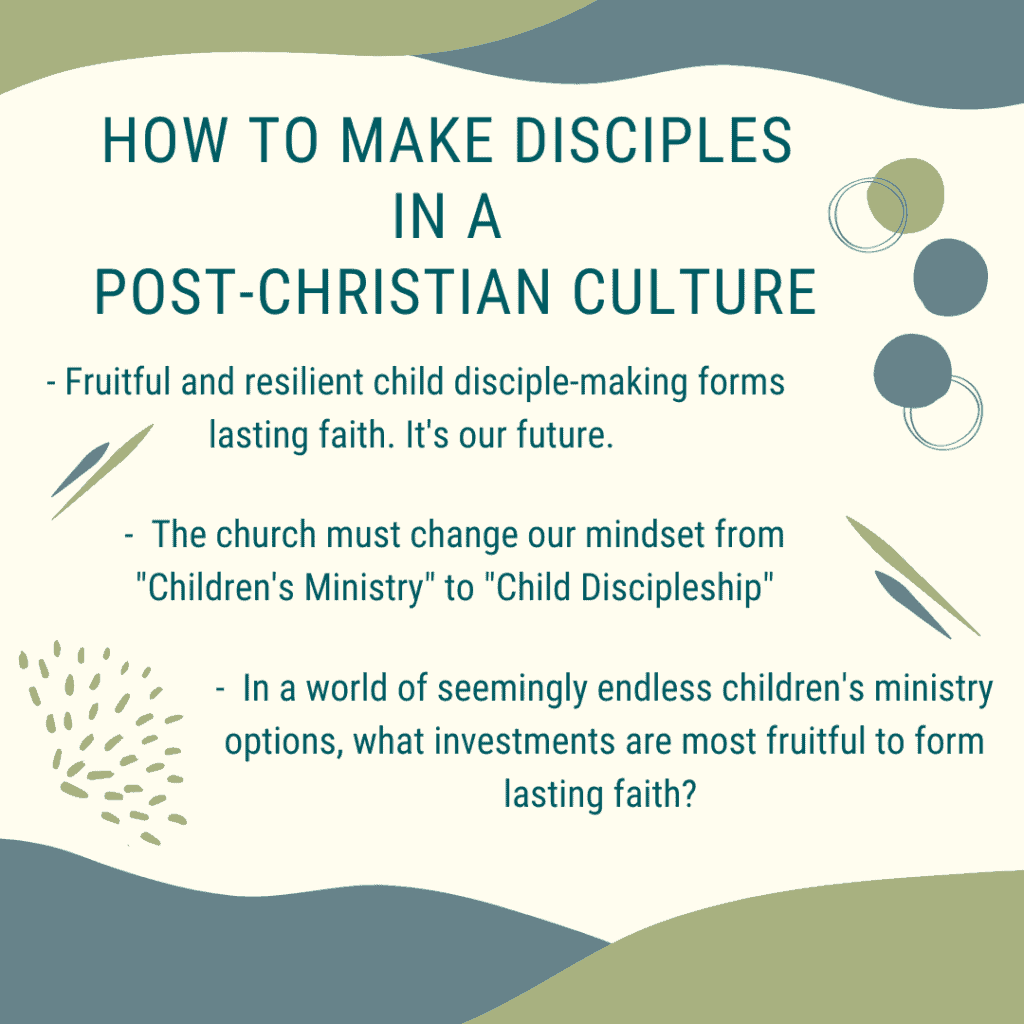
Did My Abortion Disqualify Me from Being Used by God?
God will even use your abortion healing for His glory and your good. The creator of the universe only requires a willing and submitted heart.

Learning how to make disciples in a Post-Christian culture is the greatest task ahead of us.
Learning how to make disciples in a Post-Christian culture is the greatest task ahead of us. One recent phenomenon we’ve experienced in 2020 and 2021 has been a wave of high-profile evangelicals who have announced, usually through social media, they have deconstructed their faith and joined the Post-Christian culture.
When I hear these stories, like you, I’m deeply saddened. Even after I consume their social media and read their blog posts, I’m often unclear of their substantive reasoning.
Often, I am left wondering, “Is there more to the story that we are not hearing? Was it rational? Emotional? Volitional?
More specifically, how could the church, or a disciple-maker, have made a difference? Even further, is there anything the Church did that harmed them along the way?”
Post-Christian cultures tend to include cultures where Christianity is no longer the dominant or influential religion in society. In other words, it’s a reaction against Christianity that wants the benefits of Christ, but with no connection to the Christian faith.. In circumstances where people walk away from Christianity, we often observe themes like:
But one thing no one seems to be talking about relating to faith deconstruction that leads to departure from the church is the most systemic antidote.
If I may be so bold, I’d like to make a recommendation.
Fruitful and resilient child disciple-making forms lasting faith. It’s our future.
There, I said it.
You know what, though? I don’t think that’s all that bold of a claim. It’s just a lonely position to declare in such a public medium. Very few people speak up on behalf of the kids in the Church. And kids are often overlooked in the most critical conversations relating to the Church.
Why?
Kids don’t fund budgets or sit on elder boards. Kids don’t cast votes in church polity. Usually, kids don’t fill the auditorium/sanctuary. Quite the opposite, kids often are overlooked first. Just ask COVID-19.
In the United States, the Church is at a unique inflection point. One thing we’ve been saying where I serve and lead is, “Although we didn’t anticipate Covid, we did anticipate the things Covid has revealed.”
We have a discipleship crisis in the United States. You and I know this. In recent decades, we’ve fallen in love with lesser things in the Church. And now is the time to go back to the Gospels and the New Testament. In hopes to rebuild the Church biblically in the U.S. for this cultural moment.
Our organization, Awana, works with 62,000 churches globally and the leading comment we hear from pastors since Covid goes something like this.
” The key word for us as a church is ‘rebuild’ … no matter the size of the church, we (pastors) are all on a level playing field and now have to all think more like a church planter. We are in rebuild mode.”
In the rebuild ahead, one of the key factors for church leaders is prioritizing how to make disciples in our new Post-Christian reality. Now, let’s step back and unpack this in more detail.

This idea that we are living in a Post-Christian Culture isn’t new. As a matter of fact, well known theologian and philosopher Francis Schaeffer was talking about this decades ago. Even when far fewer in the U.S. experienced Post-Christianity.
But today, secularism marks our world. Our kids swim in water focused on the dismissal of God and emphasis on the individual. Parents, grandparents, pastors – we’re all really feeling it. We all find ourselves in a unique cultural moment-one we rightly call Post-Christian. But what does it mean? And more specifically, what will it mean for learning how to make disciples of today’s children for the future of the Church?
We see this all around us. Perhaps you’ve heard it said, “You Be You.” “My Body, My Choice.” “Live Your Truth.” “You are enough!” Even if you are unfamiliar with these mantras, trust me, your kids and grandkids know them well.
What is going on here exactly? These sayings are rally cries of our day: freedom, justice, happiness, purpose, fulfillment, redemption, restoration and more. But what’s missing in these cries from the new, dominant culture is the Gospel.
Notice: there’s no Bible, no God, no Jesus in these sayings. Christianity no longer has a seat at the mainstream cultural table. Much like a bouquet of flowers that’s been clipped from their roots, a Post-Christian culture wants the beauty of the goals, outcomes and fruit that comes from Christianity, but in a way, that’s cut off from the root system. Our children now swim in this dominantly Post-Christian culture.
What does this have to do with faith deconstruction? And what does this specifically have to do with our children? In simple terms, deconstruction is the process of understanding how something was formed. In other words, learning to take faith apart and perform an analysis.
On the other hand, child discipleship is the proactive process of forming a child in the image and identity of Jesus: helping the child to belong to Jesus and his Church, to believe in Him and to become like Him and walk in His ways. You could say that deconstruction is the “unpacking of how a person was formed” … and discipleship is the “proactive process of forming someone to be like Jesus.”
So, as we think about the formation of our Christian children and young disciples today, it’s not a matter of “Is secularism and/or post Christian culture forming ‘churched’ children?”
It’s a matter of “How is the culture forming them?”
The idea of being formed in the image of an individualist isn’t new. You could rightly say that it began in the garden in Genesis chapter three. Adam and Eve had a choice: Self? Or God? But what’s different today is our digital technology, screens, social media, and mobile information systems. With technology, this formation process is happening more aggressively and at an earlier age.
To further heighten the sense of urgency, there’s one more thing parents, grandparents, and church leaders need to consider… Are you ready? Deep breath. Ok, now keep reading.
According to The Barna Group, most humans form their worldview by age 13. This is the middle school student in your church… the kid who, just two years ago, was in your children’s ministry. We tend to talk about the student-church-dropout-rates as if it’s a youth ministry issue.
But if a human’s worldview is largely formed by age 13, isn’t this more of a children’s ministry (child formation or child discipleship) conversation?
Therefore, some children’s ministry leaders have begun asking a strategic question about the future: Are we adequately preparing today’s kids to engage the culture and lead the church of 2050? As you may have guessed, the near-unanimous, resounding common response is, ” No.” Followed by, “Ugh.”
There’s a passage of Scripture in 1 Chronicles 12 that talks about the men of Issachar who understood the times and knew what to do. As parents, grandparents, and church leaders, we understand the following:
When you consider the influence of how today’s young people are being formed, is there any wonder we are experiencing a faith deconstruction phenomenon? For children’s ministry as we know it to remain the same, and to expect different disciple-making results, would be insanity. So, what’s next?
The church must change our mindset from “Children’s ministry” to “Child Discipleship.”
The best way to get ahead of Post-Christian culture and faith deconstruction is to form resilient child disciples in the identity of Jesus Christ. The problem is, children’s ministry as we know it today hasn’t really experienced any substantive or systemic change since the early 2000’s. For most, we’re stuck in large group/small group dynamics and emphases on education through entertainment, as well as Disney-like children’s ministry.
Children’s ministry can mean a lot of things, from child-care, to entertainment, to Bible teaching and beyond. But resilient child discipleship is a specific target, and it gives kids a robust faith that can bend and flex but not break under the weight of culture.
It’s the right target we can aim for in a Post-Christian culture that has little margin for the lesser things of the past. Disciple-making is about formation. It’s about our children forming a resilient identity in Jesus Christ.
When we were swimming in a majority Christian culture, it was easy to not focus on the outcomes or key metrics of children’s ministry, which tend to form lasting faith. Unfortunately, aggressive secularism is here to stay. But our approach must change, and it must change to child discipleship.
Let me leave us with this…what if we started asking this new question:
In a world of seemingly endless children’s ministry options, what investments are most fruitful to form lasting faith?
As you wrestle with this question, let me recommend a few resources to help you and your family while you process amid this unique cultural moment.
May God bless you as you help make disciples who will bend and flex but not break under the weight of culture. Let’s raise a generation who will love Jesus, engage the culture, and fearlessly lead the future of the Church.